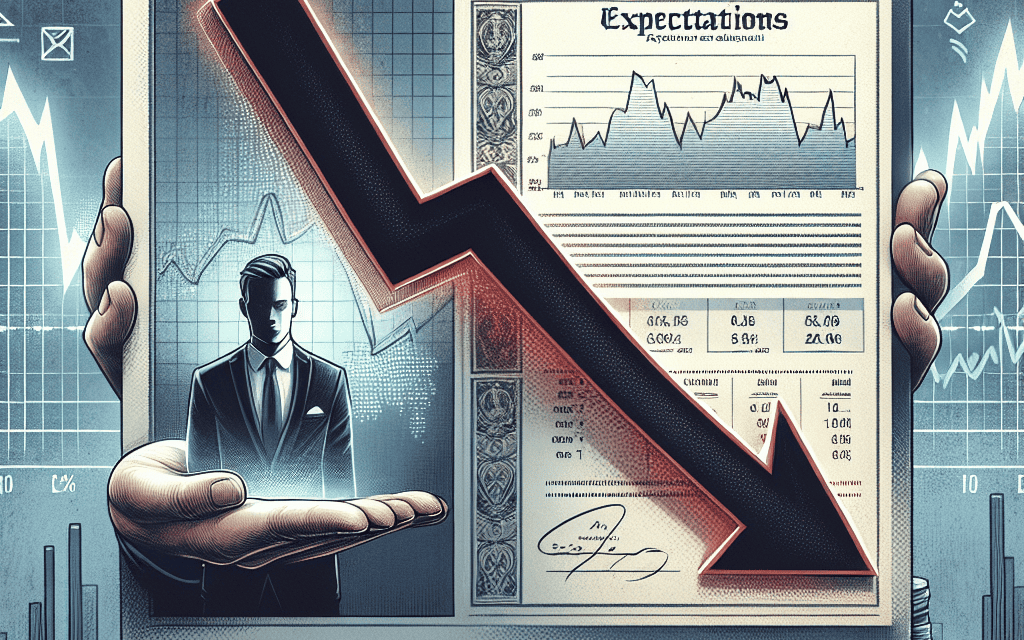“Zoetis Shares Slip: Surpassing Forecasts, Yet Market Remains Unmoved.”
Introduction
Zoetis, a leading global animal health company, recently experienced a dip in its share price despite reporting financial results that surpassed market expectations and revising its future outlook upwards. The company’s performance was bolstered by strong sales across its diverse portfolio of veterinary products, which cater to both livestock and companion animals. However, the decline in share value suggests that investors may have had higher anticipations or concerns about other market factors impacting the company’s long-term growth. This development highlights the complex dynamics of investor sentiment and market reactions, even in the face of seemingly positive corporate announcements.
Market Reaction: Understanding Why Zoetis Shares Fell Despite Positive Earnings
Zoetis, a leading global animal health company, recently reported its quarterly earnings, surpassing Wall Street expectations and raising its financial outlook for the year. Despite these positive developments, the company’s shares experienced a surprising dip, leaving investors and market analysts puzzled. This phenomenon, where a company’s stock price falls despite seemingly favorable news, is not uncommon in the financial markets. Understanding the underlying reasons for such market reactions requires a closer examination of investor behavior, market dynamics, and broader economic factors.
To begin with, it is essential to recognize that stock prices are influenced by a myriad of factors beyond just earnings reports. While Zoetis indeed delivered better-than-expected results, investors often look beyond the immediate financial performance to assess the company’s long-term prospects. In this context, even a slight hint of uncertainty or potential challenges in the future can overshadow current achievements. For instance, if there are concerns about the sustainability of Zoetis’s growth trajectory or potential headwinds in the animal health industry, investors might react cautiously, leading to a decline in the stock price.
Moreover, market expectations play a crucial role in determining stock price movements. When a company like Zoetis raises its financial outlook, it sets a new benchmark for future performance. Investors may have already priced in the anticipated positive results, and any deviation from their expectations, even if minor, can trigger a sell-off. This phenomenon, often referred to as “buy the rumor, sell the news,” occurs when investors preemptively purchase shares in anticipation of good news and subsequently sell them once the news is confirmed, leading to a temporary dip in the stock price.
Additionally, broader market conditions and investor sentiment can significantly impact individual stock performance. In times of economic uncertainty or market volatility, investors may adopt a risk-averse approach, opting to sell shares even in fundamentally strong companies like Zoetis. This behavior is often driven by a desire to preserve capital or reallocate investments to perceived safer assets. Consequently, even positive earnings reports may not be sufficient to counteract the prevailing market sentiment, resulting in a decline in stock prices.
Furthermore, it is important to consider the role of institutional investors and their influence on stock price movements. Large institutional investors, such as mutual funds and pension funds, hold significant stakes in companies like Zoetis. Their trading decisions can have a substantial impact on the stock price. If these investors decide to rebalance their portfolios or take profits following a strong earnings report, it can lead to increased selling pressure, contributing to the decline in the stock price.
In conclusion, while Zoetis’s recent earnings report and raised outlook were undoubtedly positive, the subsequent dip in its share price can be attributed to a combination of factors. Investor expectations, market sentiment, and broader economic conditions all play a role in shaping stock price movements. Understanding these dynamics is crucial for investors seeking to navigate the complexities of the financial markets. As Zoetis continues to execute its growth strategy and address any potential challenges, it remains to be seen how its stock will perform in the long term.
Investor Sentiment: Analyzing the Disconnect Between Earnings and Stock Performance
Zoetis, a leading global animal health company, recently reported its quarterly earnings, surpassing analysts’ expectations and raising its financial outlook for the year. Despite these positive developments, the company’s shares experienced a dip, leaving investors puzzled. This phenomenon, where a company’s stock performance does not align with its financial achievements, is not uncommon in the stock market. Understanding the underlying factors contributing to this disconnect requires a closer examination of investor sentiment and market dynamics.
To begin with, it is essential to recognize that stock prices are influenced by a myriad of factors beyond a company’s financial performance. While earnings reports provide a snapshot of a company’s current health, investors often look ahead, considering future growth prospects and potential risks. In the case of Zoetis, despite the upbeat earnings report, investors may have concerns about broader market conditions or industry-specific challenges that could impact the company’s long-term trajectory. For instance, fluctuations in the global economy, changes in regulatory environments, or shifts in consumer demand can all weigh heavily on investor sentiment.
Moreover, the stock market is inherently forward-looking, with investors constantly seeking to anticipate future developments. As a result, even when a company reports strong earnings, if the market perceives any potential headwinds or uncertainties, it can lead to a decline in stock prices. In Zoetis’s case, while the company raised its outlook, investors might be wary of potential challenges such as supply chain disruptions, rising costs, or competitive pressures that could affect future performance. These concerns, whether substantiated or speculative, can create a cautious atmosphere among investors, leading to a sell-off despite positive earnings news.
Additionally, market psychology plays a significant role in shaping investor behavior. The stock market is often driven by emotions, with fear and greed influencing decision-making processes. In times of market volatility or economic uncertainty, fear can overshadow positive news, prompting investors to adopt a risk-averse stance. This behavior can result in stock price declines even when a company demonstrates strong financial results. In the case of Zoetis, broader market volatility or geopolitical tensions may have contributed to a more cautious investor sentiment, overshadowing the company’s earnings success.
Furthermore, it is important to consider the role of institutional investors and market analysts in shaping stock performance. Large institutional investors, such as mutual funds and pension funds, wield significant influence over stock prices due to the volume of shares they trade. Their investment decisions are often guided by complex models and analyses that take into account a wide range of factors beyond immediate earnings results. Similarly, market analysts provide recommendations and price targets that can sway investor sentiment. If analysts express concerns about Zoetis’s future prospects or issue downgrades, it can lead to a negative impact on the stock price, regardless of the company’s current performance.
In conclusion, the disconnect between Zoetis’s strong earnings report and the subsequent dip in its stock price underscores the complexity of investor sentiment and market dynamics. While financial performance is a critical component of stock valuation, it is not the sole determinant. Investors must navigate a landscape influenced by future expectations, market psychology, and the actions of influential market participants. Understanding these factors can provide valuable insights into the often perplexing relationship between earnings and stock performance, offering a more comprehensive perspective on the intricacies of the stock market.
Financial Outlook: How Zoetis’ Raised Guidance Impacts Future Prospects
Zoetis, a leading global animal health company, recently reported its quarterly earnings, surpassing Wall Street expectations and subsequently raising its financial outlook for the year. Despite these positive developments, the company’s shares experienced a dip, leaving investors and analysts pondering the implications for Zoetis’ future prospects. This paradoxical market reaction underscores the complex dynamics at play in the financial world, where even favorable news can sometimes lead to unexpected outcomes.
To begin with, Zoetis’ performance in the recent quarter was commendable. The company reported earnings that exceeded analysts’ forecasts, driven by robust sales across its diverse portfolio of animal health products. This strong performance was attributed to increased demand in both the livestock and companion animal segments, reflecting the growing global emphasis on animal health and welfare. Moreover, Zoetis’ strategic investments in research and development have continued to yield innovative products, further solidifying its position as a leader in the industry.
In light of these achievements, Zoetis raised its financial guidance for the remainder of the year. This upward revision reflects the company’s confidence in its ability to sustain growth and capitalize on emerging opportunities in the animal health sector. The revised outlook suggests that Zoetis anticipates continued strong demand for its products, bolstered by favorable market trends and its expanding global footprint. Consequently, this positive guidance should, in theory, have bolstered investor confidence and driven share prices upward.
However, the market’s reaction was contrary to expectations, as Zoetis shares experienced a decline following the earnings announcement. This unexpected dip can be attributed to several factors that may have tempered investor enthusiasm. Firstly, despite the raised guidance, some investors may have been concerned about potential headwinds facing the company. These could include macroeconomic uncertainties, such as fluctuating currency exchange rates and geopolitical tensions, which could impact Zoetis’ international operations.
Additionally, the broader market environment may have played a role in the share price decline. In recent times, financial markets have been characterized by heightened volatility and investor caution, driven by concerns over inflation, interest rate hikes, and global economic stability. In such a climate, even companies with strong fundamentals and positive outlooks can experience share price fluctuations as investors reassess their portfolios and risk appetites.
Furthermore, it is important to consider the possibility of profit-taking by investors. Following a period of strong performance, some shareholders may have opted to lock in gains, leading to selling pressure on Zoetis shares. This is a common occurrence in the stock market, where short-term trading dynamics can sometimes overshadow long-term fundamentals.
Looking ahead, Zoetis’ raised guidance bodes well for its future prospects. The company’s commitment to innovation, coupled with its strategic focus on expanding its product offerings and geographic reach, positions it well to navigate potential challenges and seize growth opportunities. Moreover, the underlying trends in the animal health industry, such as increasing pet ownership and rising demand for livestock health solutions, provide a favorable backdrop for Zoetis’ continued success.
In conclusion, while the immediate market reaction to Zoetis’ earnings report may have been unexpected, the company’s strong performance and raised guidance underscore its potential for sustained growth. Investors and analysts will likely continue to monitor Zoetis’ progress closely, as it seeks to build on its achievements and deliver value to shareholders in the long term.
Competitive Landscape: Evaluating Zoetis’ Position in the Animal Health Industry

Zoetis, a leading player in the animal health industry, recently experienced a dip in its share price despite surpassing market expectations and raising its financial outlook. This development has prompted industry analysts and investors to reevaluate the company’s position within the competitive landscape of animal health. As the largest global producer of medicine and vaccinations for pets and livestock, Zoetis has consistently demonstrated robust performance, driven by its innovative product pipeline and strategic market expansions. However, the recent decline in share value suggests that external factors and competitive pressures may be influencing investor sentiment.
To understand Zoetis’ current standing, it is essential to consider the broader dynamics of the animal health industry. This sector has been experiencing significant growth, fueled by increasing pet ownership, rising demand for animal protein, and heightened awareness of zoonotic diseases. Consequently, companies within this space are vying for market share by investing in research and development, expanding their product portfolios, and enhancing their global reach. Zoetis, with its comprehensive range of products and services, has been at the forefront of these efforts, consistently outperforming many of its peers.
Despite its strong market position, Zoetis faces competition from both established players and emerging companies. Major competitors such as Elanco Animal Health, Merck Animal Health, and Boehringer Ingelheim Animal Health are continuously innovating and expanding their offerings, which intensifies the competitive landscape. These companies are leveraging advancements in biotechnology and digital health solutions to develop new treatments and improve animal care. As a result, Zoetis must remain vigilant and agile to maintain its leadership position.
Moreover, the animal health industry is not immune to external challenges, such as regulatory changes, supply chain disruptions, and economic fluctuations. These factors can impact the operational efficiency and profitability of companies like Zoetis. For instance, regulatory hurdles can delay product approvals, while supply chain issues may affect the timely delivery of products to market. Additionally, economic downturns can lead to reduced spending on animal healthcare, affecting sales and revenue growth.
In response to these challenges, Zoetis has been proactive in strengthening its competitive edge. The company has been investing heavily in research and development to bring innovative products to market. Its focus on precision animal health, which involves using data analytics and digital tools to enhance animal care, is a testament to its commitment to innovation. Furthermore, Zoetis has been expanding its global footprint through strategic acquisitions and partnerships, enabling it to tap into new markets and diversify its revenue streams.
Despite these efforts, the recent dip in Zoetis’ share price indicates that investors may be concerned about the company’s ability to sustain its growth trajectory amidst intensifying competition and external pressures. However, it is important to note that short-term market fluctuations do not necessarily reflect the long-term potential of a company. Zoetis’ strong fundamentals, coupled with its strategic initiatives, position it well to navigate the challenges of the competitive landscape and capitalize on emerging opportunities.
In conclusion, while Zoetis’ recent share price dip may raise questions about its competitive standing, the company’s solid foundation and proactive strategies suggest that it remains a formidable player in the animal health industry. As the sector continues to evolve, Zoetis’ ability to innovate and adapt will be crucial in maintaining its leadership position and delivering value to its stakeholders.
Earnings Breakdown: Key Takeaways from Zoetis’ Latest Financial Report
Zoetis, a leading global animal health company, recently released its latest financial report, which revealed a complex narrative of both triumph and market skepticism. Despite surpassing Wall Street expectations and revising its outlook upward, Zoetis shares experienced a surprising dip. This paradoxical market reaction underscores the multifaceted nature of investor sentiment and the intricate dynamics of financial markets.
To begin with, Zoetis reported earnings that exceeded analysts’ forecasts, showcasing the company’s robust performance in the animal health sector. The company’s revenue for the quarter reached an impressive figure, driven by strong sales across its diverse portfolio of products. Notably, the companion animal segment continued to be a significant growth driver, reflecting the ongoing trend of increased pet ownership and the corresponding demand for veterinary care. Furthermore, the livestock segment also demonstrated resilience, benefiting from the recovery in global agricultural markets.
In addition to its solid revenue performance, Zoetis raised its full-year outlook, signaling confidence in its ability to sustain growth momentum. This upward revision was attributed to several factors, including the successful launch of new products and the expansion of its market presence in key regions. The company’s strategic investments in research and development have also begun to bear fruit, with innovative solutions poised to address emerging health challenges in both companion and livestock animals.
Despite these positive indicators, Zoetis shares experienced a decline, a development that may seem counterintuitive at first glance. However, a closer examination reveals several underlying factors that may have contributed to this market reaction. One possible explanation is the broader market environment, which has been characterized by volatility and uncertainty. Investors may be exercising caution, opting to lock in profits amid concerns about macroeconomic conditions and potential headwinds facing the animal health industry.
Moreover, while Zoetis’ performance was commendable, some investors might have been anticipating even more substantial growth figures, given the company’s strong track record. The high expectations placed on industry leaders can sometimes lead to market disappointment, even when results are objectively positive. Additionally, the competitive landscape in the animal health sector is intensifying, with new entrants and existing players vying for market share. This heightened competition could be a factor weighing on investor sentiment, as it introduces an element of uncertainty regarding future growth prospects.
Furthermore, it is essential to consider the impact of external factors, such as regulatory changes and geopolitical developments, which can influence investor perceptions. The animal health industry is subject to stringent regulations, and any shifts in policy can have significant implications for companies operating in this space. Investors may be wary of potential regulatory hurdles that could affect Zoetis’ operations and profitability.
In conclusion, while Zoetis’ latest financial report highlights a strong performance and an optimistic outlook, the dip in its share price serves as a reminder of the complexities inherent in financial markets. The interplay of investor expectations, market conditions, and external factors can lead to outcomes that may not always align with a company’s underlying fundamentals. As Zoetis continues to navigate these challenges, its ability to adapt and innovate will be crucial in maintaining its leadership position in the animal health industry.
Stock Valuation: Assessing Zoetis’ Market Value Post-Earnings Announcement
Zoetis, a leading global animal health company, recently reported its quarterly earnings, surpassing analysts’ expectations and subsequently raising its financial outlook for the year. Despite these positive developments, the company’s shares experienced a dip, prompting investors and analysts to reassess its market valuation. This paradoxical market reaction underscores the complexities inherent in stock valuation, where multiple factors beyond earnings reports influence investor sentiment and stock prices.
To begin with, Zoetis’ ability to exceed earnings expectations is a testament to its robust business model and strategic initiatives. The company has consistently demonstrated strong performance across its diverse portfolio of products and services, catering to both livestock and companion animals. This success is largely attributed to its innovative research and development efforts, which have resulted in a steady pipeline of new products that meet the evolving needs of the animal health industry. Furthermore, Zoetis’ global reach and established distribution networks have enabled it to capitalize on emerging markets, thereby driving revenue growth.
However, despite these positive indicators, the dip in Zoetis’ share price suggests that investors may be considering other factors that could impact the company’s future performance. One possible explanation is the broader market conditions, which have been characterized by volatility and uncertainty. In such an environment, even companies with strong fundamentals can experience fluctuations in their stock prices as investors react to macroeconomic trends and geopolitical events. Additionally, concerns about inflation and interest rate hikes may have contributed to a more cautious approach among investors, leading to a temporary decline in Zoetis’ market value.
Moreover, the animal health industry, while generally resilient, is not immune to challenges. Regulatory changes, competitive pressures, and shifts in consumer preferences can all pose risks to Zoetis’ growth trajectory. Investors may be factoring in these potential headwinds when evaluating the company’s long-term prospects. For instance, increased competition from generic products could erode market share, while changes in agricultural practices might affect demand for livestock-related products. These considerations highlight the importance of a comprehensive analysis that goes beyond immediate financial results.
In light of these complexities, it is crucial for investors to adopt a holistic approach when assessing Zoetis’ market value. This involves not only examining the company’s financial performance but also considering qualitative factors such as management effectiveness, strategic positioning, and industry trends. By doing so, investors can gain a more nuanced understanding of the company’s potential for sustained growth and profitability.
Furthermore, it is important to recognize that short-term fluctuations in stock prices do not necessarily reflect a company’s intrinsic value. While market sentiment can drive temporary price movements, the underlying fundamentals ultimately determine long-term value creation. Therefore, investors should remain focused on Zoetis’ strategic initiatives and its ability to adapt to changing market dynamics.
In conclusion, the recent dip in Zoetis’ share price, despite its strong earnings performance and raised outlook, serves as a reminder of the multifaceted nature of stock valuation. By considering both quantitative and qualitative factors, investors can make more informed decisions about the company’s market value. As Zoetis continues to navigate the complexities of the animal health industry, its commitment to innovation and growth positions it well for future success, even amidst the challenges that lie ahead.
Strategic Initiatives: Exploring Zoetis’ Plans for Growth Amid Market Volatility
Zoetis, a leading global animal health company, recently experienced a dip in its share price despite surpassing market expectations and raising its financial outlook. This paradoxical market reaction underscores the complexities of investor sentiment and the broader economic environment. As Zoetis navigates these challenges, it is essential to explore the strategic initiatives the company is implementing to ensure sustained growth amid market volatility.
To begin with, Zoetis has consistently demonstrated robust performance, driven by its innovative product portfolio and strong market presence. The company’s ability to exceed earnings expectations is a testament to its operational efficiency and strategic foresight. However, the recent dip in share price suggests that investors may be concerned about external factors, such as economic uncertainty and fluctuating market conditions, which could impact future performance. In response, Zoetis is focusing on several strategic initiatives designed to bolster its resilience and capitalize on growth opportunities.
One of the key areas of focus for Zoetis is expanding its research and development efforts. By investing in cutting-edge technologies and novel therapeutics, the company aims to maintain its competitive edge and address emerging health challenges in the animal sector. This commitment to innovation not only enhances Zoetis’ product pipeline but also positions the company to meet the evolving needs of its customers. Furthermore, by prioritizing R&D, Zoetis can continue to deliver high-quality solutions that drive long-term growth.
In addition to innovation, Zoetis is also concentrating on geographic expansion to diversify its revenue streams and mitigate risks associated with market volatility. By entering new markets and strengthening its presence in existing ones, the company can tap into a broader customer base and leverage growth opportunities in regions with increasing demand for animal health products. This strategic expansion is complemented by targeted acquisitions and partnerships, which enable Zoetis to enhance its capabilities and accelerate its growth trajectory.
Moreover, Zoetis is committed to sustainability and corporate responsibility, recognizing that these elements are integral to its long-term success. By implementing environmentally friendly practices and promoting animal welfare, the company not only fulfills its ethical obligations but also strengthens its brand reputation. This focus on sustainability is increasingly important as consumers and investors alike prioritize companies that demonstrate a commitment to social and environmental stewardship.
Another critical component of Zoetis’ growth strategy is digital transformation. By harnessing the power of data analytics and digital tools, the company can optimize its operations, improve customer engagement, and enhance decision-making processes. This digital shift allows Zoetis to streamline its supply chain, reduce costs, and deliver more personalized solutions to its clients. As the digital landscape continues to evolve, Zoetis’ proactive approach to technology adoption will be instrumental in maintaining its competitive advantage.
In conclusion, while Zoetis’ recent share price dip may raise concerns among investors, the company’s strategic initiatives provide a solid foundation for future growth. By focusing on innovation, geographic expansion, sustainability, and digital transformation, Zoetis is well-positioned to navigate market volatility and capitalize on emerging opportunities. As the animal health industry continues to evolve, Zoetis’ commitment to these strategic priorities will be crucial in driving its long-term success and delivering value to its stakeholders.
Q&A
1. **What caused Zoetis shares to dip despite positive news?**
Investor concerns about broader market conditions or profit-taking after the earnings report may have contributed to the dip.
2. **How did Zoetis perform in its recent earnings report?**
Zoetis beat analysts’ expectations in its recent earnings report.
3. **What specific metrics did Zoetis exceed expectations in?**
Zoetis exceeded expectations in revenue and earnings per share (EPS).
4. **What was Zoetis’ revised outlook?**
Zoetis raised its financial outlook for the remainder of the fiscal year.
5. **What sector does Zoetis operate in?**
Zoetis operates in the animal health sector.
6. **What are some potential reasons for the market’s reaction to Zoetis’ report?**
Potential reasons include market volatility, sector-specific concerns, or investor focus on future guidance rather than past performance.
7. **What might investors be concerned about despite the positive earnings report?**
Investors might be concerned about macroeconomic factors, competitive pressures, or supply chain issues impacting future performance.
Conclusion
Zoetis shares experienced a decline despite the company surpassing earnings expectations and raising its financial outlook. This paradoxical market reaction may be attributed to broader market conditions, investor profit-taking, or concerns about future growth sustainability. While the company’s strong performance and optimistic forecast indicate robust operational health, external factors or investor sentiment might have overshadowed these positive developments, leading to the dip in share price.





